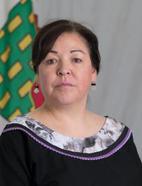Thank you, Mr. Speaker. Today I rise to provide an update to Northerners on the 2019 novel coronavirus. I would like to assure residents that, at this time, the risk of contracting this virus is low in the Northwest Territories.
Since the coronavirus was first reported in the Hubei Province of China, our government and the federal government have moved quickly to ensure we are prepared. Our public health and emergency preparations are well underway and we hope to continue to monitor the situation as it develops.
I would like to fill Members in on the preparations we've been undertaking, as I know that the anxiety level about this outbreak has increased in our communities.
Our Chief Public Health Officer is providing leadership to our health emergency planners and senior management within the Health and Social Services system to ensure our communities and our frontline staff are ready should the coronavirus be suspected or confirmed in the Northwest Territories. The Office of the Chief Public Health Officer and health emergency officials are constantly in touch with their federal, provincial, and territorial counterparts to ensure the sharing of timely and accurate information.
I am sure Members and residents are curious as to what specific preparations we have completed to date, and if we are prepared to handle possible cases in the NWT.
It is important to remind everyone that we've been here before. We have learned a great deal from the 2009 H1N1 influenza pandemic; the 2003 outbreak of Severe Acute Respiratory Syndrome, also known as SARS; and the ongoing surveillance of the Middle East Respiratory Syndrome, known as MERS. Similar to the current outbreak, these events have required international coordination and response, as well as preparations here within the Northwest Territories. As with these other events, there is no vaccine; instead, the approach is to prevent the spread of the coronavirus using the best practices in public health.
This is vital in order to rapidly identify people who might be sick and apply appropriate precautions in healthcare settings and communities. Our Chief Public Health Officer and her office is participating in daily briefings with her federal, provincial, and territorial counterparts to get the latest information to inform clinical information for frontline staff. Internal alerts are sent to frontline staff to ensure their personal protective equipment is ready, testing protocols are defined, necessary infection control measures are being practiced, and health facilities are ready to respond in the event that a person in the Northwest Territories develops symptoms concerning novel coronavirus infection.
We also have a responsibility to communicate to our residents, Indigenous and community governments, schools, tourist operators, daycare centres, and businesses. Mr. Speaker, these stakeholders were provided the most current information on hand, along with public education materials for them to share with their stakeholders. As this situation is rapidly evolving, we are committed to providing the most current information through the Department of Health and Social Services website.
We have also started a general communication campaign through social media and traditional media, including newspapers and radio ads to raise awareness about the virus. This includes preventive steps residents can take to protect themselves and their loved ones. The advice will sound very familiar, as it is similar to what we recommend for the flu, such as staying home if you're sick and contacting your local public health unit or health centre if you have any symptoms of concern. Also, the importance of regular hand-washing, the use of hand sanitizers, and healthy respiratory practices cannot be emphasized enough, especially since we have other infectious diseases circulating in our communities, including the flu and whooping cough, or pertussis. These practices will help reduce the spread of these illnesses.
Travellers from places of known activity of this coronavirus, particularly the Hubai Province of China, are being provided information at their international points of entry into Canada to self-monitor. We know that residents of the Northwest Territories travel internationally for both business and pleasure. It is important that residents pay special attention to travel advisories issued by the federal government. This information is routinely updated on the Government of Canada's website under Travel Advice and Advisories. This link is found on our department's website, including direct reference on our coronavirus section.
Mr. Speaker, as this situation evolves, our thoughts are with China as they continue to take extraordinary efforts to contain this epidemic. Our thoughts are also with Canadian individuals and families who have been impacted by these events directly or indirectly. The Northwest Territories will continue to monitor and assess this dynamic situation and be a part of the national action to ensure we are prepared as a healthcare system and as a government. Thank You, Mr. Speaker.
